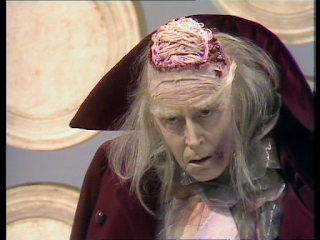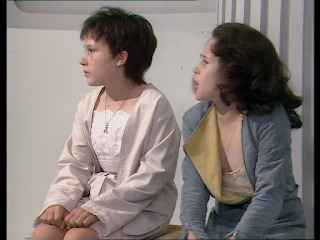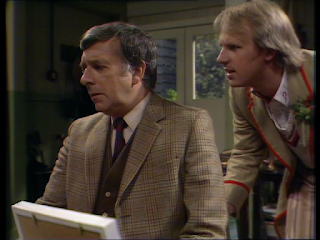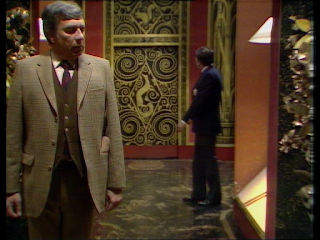
Back at the end of August, I was on an unrelated trip to the end of the Piccadilly line at Cockfosters in North London. I ended up in Trent Country Park, a large country park (unsurprisingly given the name) which is rather a nice place if you ever happen to be in the area. While walking along some ponds, I happened to spot a large white obelisk at the top of a hill. Naturally, being a sad Doctor Who fan my first thought was 'that looks like the obelisk from Mawdryn Undead!' A brief Google search later, and yes, it turned out it was the obelisk from Mawdryn Undead. Well, I had to go and have a look, didn't I? And so one gentle climb later and there I was.

The obelisk itself is remarkably similar to how it was 37 years ago, although its immediate surroundings not so much - if you look at the picture below, the wooden fence is gone and you can get right next to the obelisk, and the bench Nyssa is standing in front of in the picture below has been replaced by a newer one. It also goes without saying that the state of the greenery has changed quite a bit, not least the actual hill leading up to the obelisk which is distinctly less green these days than it was then, but its still quite an interesting little time capsule. And when else can you say you've stood on the same ground as Nicholas Courtney?
 |
| Nyssa made a mental note to replace the bench for when The A-Z of Classic Who would turn up 37 years later |
Anyway, a nice thing to find and given the proximity to reviewing it here it would have been remiss of me not to mention it. Rather unfortunately, the large building nearby that doubles as the school in the story is covered in scaffolding and sealed off for some development or other, which is disappointing but given all we see of the exterior are a few brief shots and most of the inside is probably much nearer a very different Tube station (hint: White City) it's probably not that much of a loss. Anyway, here's me in front of the obelisk with Binro from The Ribos Operation in place of my face.
If you're in the London area and fancy a trip to a bit of an obscure but relatively unchanged Classic Who location, the end of the Piccadilly line beckons. And that's quite enough of my travel plans and back to boring old Doctor Who.
Mawdryn Undead sits near the middle of Doctor Who's 20th season, an anniversary that John Nathan-Turner decided to mark by having an old monster return in every story of the season. Now this was perhaps not the smartest of ideas given the constraints it would place on the writers and the trilogy that started with this story and ended with the already covered Enlightenment decided to cheat a bit and just have the Black Guardian (from the 16th Season's Key to Time story, of which The Ribos Operation was the first story - see, these humorous bits don't just come from nowhere) appear in all three stories as a background plot. Now this is both a blessing and a problem - its a blessing in that it means the writers of all three stories can essentially tell their own tales without particularly worrying about having to shoehorn in this unecessary element, its a problem in that the plot isn't written terribly well and tends to distract from things we actually care about. Except in Terminus where its a distraction from the bizarre tedium. But we're not reviewing Terminus, we're reviewing Mawdryn Undead.
 |
| What most people look like after being forced to watch Terminus |
The biggest difference between this story and Enlightenment, however, is that you couldn't really remove the Black Guardian stuff from that story without doing some fairly fundamental changes to it - i.e the Enlightenment itself. Mawdryn Undead is different in that you can remove all the Black Guardian stuff from the story and it barely changes - in fact, you probably wouldn't have much difficulty completely removing Turlough from the story. The Black Guardian stuff feels utterly tacked on, totally irrelevant to what else is going on and really not compelling on its own. Valentine Dyall's performance is sadly lacking, coming across as a pompous idiot without any real menace or gravitas, and his motivation for wanting to kill the Doctor is hideously one-dimensional. "He defeated me that one time" is not really all that much for the audience to go on, given it was around six years earlier for them and there was no such thing as DVD or Netflix for them to catch up - for all most of the audience knew, this was a guy wanting to kill the Doctor because he took his parking space or something. Worst of all, the costume designer must have been on some good shit for this story, because look at what he has on his head.
 |
| "Oh no, it wasn't an intentional choice, it just died mid-air and landed on my head and I thought what the hell" |
This is also Turlough's introductory story, and while I don't doubt he was meant to be an annoying little shit... he is an annoying little shit. You really think after Adric they would have learnt their lesson, but evidently not. He spends the entire story either complaining, betraying people, whinging or making things worse for everyone, including the omnipotent being he's supposed to be serving. It's very reminiscent of Adric at his worse, which is only really saved by the fact that Mark Strickson is a much better actor than Matthew Waterhouse and does his best to save the crappy part he's given (the fact the character would get much better after this trilogy once he becomes confident and capable rather than a whinging shit supports this.)
I think this would have been more acceptable if Turlough redeemed himself at some point, but he never does - his behaviour never changes and he doesn't learn any lessons. His joining the TARDIS crew at the end of the story feels totally unearned - what's he done to deserve joining you Doctor? You literally got more help this story from the damn villain. In the story's defence, it is part of a trilogy and I guess the intention was for him to develop over these three stories, but taking this story on its own, Turlough's arc is pretty poor.
 |
| Oh no! A weird crystal cup thing! |
As for everyone else, well its up and down. To start with down, Nyssa and Tegan have an adventure to forget. Their job throughout the story is essentially 'The Exposition Duo' (Tegan: This thing is impossible! Nyssa: No it isn't. Tegan: Oh no!) Sarah Sutton is clearly beyond done with the show in this, her penultimate story, and who can blame her when all she does is spout off meaningless technobabble all story. Now with both the introduction of Nyssa's replacement and two Brigadiers in the story, I guess its understandable they don't have that much to do, but it's still disappointing for them to have so little. Also, the costumes for this story are really bad - it's not quite 'Peri in the first half of Season 22' bad but its getting there. There's a scene where Nyssa and Tegan are reverted to children which is exceptionally uncomfortable in their 'not much to the imagination' costumes.
 |
| Although Nyssa's child actor at least gave more of a shit than Sarah Sutton did |
So far this story hasn't seemed very impressive, but things do pick up when we look at the main villain for the piece, other than The Birdbrain Guardian of course, the titular Mawdryn. (Also one more pretty poor thing about this story is the title - you really couldn't think of a better title for a story with an undead guy called Mawdryn?)
Mawdryn is a pretty decent bad guy though - his character design is great, his plan is suitably evil but he also has a sympathetic angle to the character. He's definitely meant to be the bad guy, but the leader of a group of people doomed to a hellish existence by fiddling with Time Lord regeneration technology, its also easy to feel sorry for him and his followers. No holes are barred by how awful their life is and it definitely helps that, unlike the Black Guardian, Mawdryn doesn't hold any grudge against the Doctor. He's just a Time Lord in the wrong place, which also helps enhance the Doctor's part of that story - his reluctance to give away the rest of his regenerations to save Mawdryn and his lads is totally understandable under the circumstances, yet he's still genuinely uncomfortable about the fate he's leaving them to, and this wouldn't work if Mawdryn was a moustache twirling bad guy. With a dead bird on his head.
I also think that the fact that, in the end, Mawdryn and his lads get what they wanted in the end, albeit through the meeting of the Brigadiers, which reinforces the idea that they were desperate people rather than bad ones. In the end, they deserved what they wanted - and what they wanted was death.
Mawdryn also has an interesting subplot in the middle of the story, convincing Nyssa, Tegan and 1977 Brigadier that he's actually a post-regenerative Doctor, a nice call back to Castrovalva and the Fifth Doctor's tulmutous change. It doesn't add up to much in the end - just a distraction until the Doctor, Turlough and 1983 Brigadier arrive on the ship, but it both works logically and allows Mawdryn to show off his villainous conning skills.
It's not all sunshine and roses of course - it's never really explained why the Doctor arrives here when he does. This all seems far too well set up for it to be a coincidence but how Mawdryn lured the Doctor in remains a mystery. It's a shame because a nice explanation involving the Brigadier could have been set up, but it seems Peter Grimwade just forgot to write it in. Like you do.
 |
| The Brigadier was very upset at the Doctor's bad breath |
The Doctor gets a decent story - as I mentioned earlier his acceptance of Turlough comes out of nowhere and isn't really earned, but the dillema with Mawdryn is done very well. He clearly feels very uncomfortable about leaving these people to a hellish existence where they can't die - and why wouldn't it given his moral code, especially of this Doctor who hated the idea of suffering and death more than most... and oversaw much more than most, but I digress. He doesn't, however, consider their plight serious enough to give away the rest of his regenerations for - in his view, they brought it on themselves by fiddling around with technology they didn't understand in an attempt to extend their lives. It's clearly this is a justification he's using to do what he wants to do, which is a nice bit of grey morality and allows Peter Davison to show his stuff, especially in a season where he'd otherwise mostly be restricted to spurting out technobabble. He also clicks immediately with Nicholas Courtney and creates a memorable Doctor-Brigadier double act - nothing on the Pertwee-Courtney act of course, but then what is?
But mention of the Brigadier brings us to Mawdryn Undead's greatest strength, and that is none other than the late great William Nicholas Stone Courtney.
 |
| Both of them |
Aside from the Doctor himself obviously, the Brigadier is probably the series most enduring single character, and that's for a very good reason. His character works because he's both very different from the Doctor - a rigid thinking, military man, with great respect for authority and his country, and given to violence when necessary, vs a free thinking pacifist scientist who spits at authority (or during most of the Brigadier's run on the show, smacks it on the back and yells "Hai!") - but also because of how similar they are. They both believe in justice and protecting the innocent - hell, in his way, the Brigadier believes in peace just as much as the Doctor does. The character has been endearing because he's both a counterpoint and a mirror to the Doctor - a different approach to his own way of thinking. It's why this story's original plan, to have Ian Chesterton return, would not have worked anything like as well - Ian was a good character, but he was never as endearing a character, because despite being the first (and a strong character in his own right), he was still just another companion. In some ways it could only have been the Brigadier.
The fact we see two Brigadiers in this story, one from 1977 and one from 1983, is a stroke of genius that allows the character to be seen from two different angles. The Brigadier from 1977, with his time in UNIT and memories of the Doctor fresh, he's positive and determined; a helpful ally to Nyssa and Tegan, while also displaying both his authoritativeness and his deductive skills. The Brigadier from 1983, without his memories of the Doctor, is a standoffish uptight twat, with his worst authoritarian traits amplified... until his memories return, when he returns to his old self, but with occasional bouts of arseholiness caused by his nervous breakdown... which is in turn of course caused by the loss of his memories caused by the meeting of the two versions of him. Ah, time travel.
The point is that it demonstrates how important the Doctor is to the Brigadier. Without his memories of him, he's precisely as you'd expect a retired military man to be - a complete prick. But because of the Doctor's influence, he's gained a strong sense of right wrong, a strong moral code... and oh, yes he's not a total arsehole. That helps. Seriously, pre-memory regaining 1983 Brigadier is really a twat.
Another strength of the relationship between the Doctor and the Brigadier in this story is that it's been updated to reflect the fact that the Doctor has changed. The relationship between Third Doctor and the Brigadier was always a love-hate one; there was clearly mutual respect and a similar moral code, but the Doctor's anti-authoritarian streak did clash with the Brigadier's loyalty to his duty. The butting heads is not present here though, and that's with good reason, because the Fifth Doctor is much less of an anti-authoritarian than his predecessor. He's hardly a lover of authority, as that would be against the Doctor's character entirely, but he's much more of a calm, patient presence. This means that he's able to see things on more of an eye-to-eye with the Doctor, which is of course helped by the fact he's retired and out of a military setting. All in all, it creates an effective and believable relationship between the two cahracters and is a welcome reappearance from Nicholas Courtney, without whom none of what I've just written would have been remotely possible. His wonderful ability to bring both authority and charm was what made the character what it was, and what made his reappearance here, 6 years later in Battlefield and two decades later in The Sarah Jane Adventures so memorable.
 |
| After all, who could pull off looking at that makeup job with a straight face? |
So what of Mawdryn Undead? It has its ups and downs to be sure - the Black Guardian stuff is quite poor and none of the three companions have a story to remember. But it does have a solid central idea, the titular character is a half-decent villain and a memorable reappearance for one of the show's most beloved characters. Parts of it lack to be sure, but Peter Davison and Nicholas Courtney more than make up for it. It's not even the strongest story in this trilogy, but there are certainly worse obelisks at the end of the Piccadilly line.
Final Score: 7/10. Even without the Brigadier stuff it wouldn't have been any worse than average, thanks to a strong premise and some good character work for the Doctor, but Nicholas Courtney and Alistair Gordon Lethbridge Stewart elevate this to a strong, if not spectacular, outing.











Comments
Post a Comment